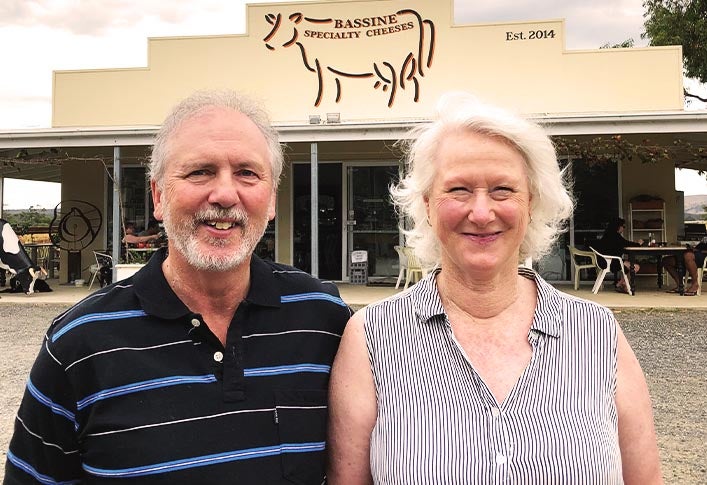Posted by on
18/01/2022
A picturesque regional dairy trail punctuated by on-farm cheeseries is Kaye Courtney’s vision for the agri-tourism industry across Victoria’s Bass River region.
It’s a concept popular in New Zealand and Tasmanian dairy regions, and this longstanding dairywoman is now leading by example.
Together with partner Glen Bisognin, Kaye helps run Bassine Specialty Cheeses, a business borne out of the opportunity to value-adding on the Bisognin family dairy operation – and one that has ultimately eclipsed the dairying.
Running what would be considered a small dairy by today’s standards – 180 Holstein cows on 95 hectares – Kaye looked to utilise her cheesemaking skills to complement the business, which was established by Glen’s parents Attillio and Mary Bisognin in 1966.
“I was making cheese for fun at home after being gifted a cheesemaking course some years earlier, and with our dairy located on a main tourist route on the Bass Highway it seemed like a great opportunity – but I was acutely aware that my hobby may not necessarily translate into a viable commercial business.
Research key to business plan
Kaye travelled across New Zealand and Tasmania researching on-farm cheese making facilities and cafes, and undertook a further cheesemaking course in New Zealand for a greater understanding of the science behind the cheesemaking process.
The trip highlighted the huge tourism opportunities within the industry, including maps of cheese trails across various regions she visited, which were akin to, and as popular as, regional wine trails.
“I would love to see a similar concept evolve in this region, the more the merrier,” she said. “Wine tours are so popular, but I think fresh milk and home-made cheese, yoghurt and even ice cream tours are equally as important, and it’s a market that’s really capturing the curiosity of consumers.”
With the Covid-19 pandemic driving a new wave of interest in food provenance, and Bassine’s ideal geographic position on the tourist route to Phillip Island, Kaye said the business was flourishing, perfectly placed to capitalise on the renewed penchant for farm fresh food.
Educating consumers
From humble beginnings, in just two years Bassine Specialty Cheeses’ Cheese Cafe has continued to evolve – with the cream on top the unexpected employment of highly celebrated cheesemaker Tone Petersen.
Today visitors can see the cheese-making process first-hand through a viewing window, sample an array of fresh dairy products and even complete cheesemaking courses on-site.
With their vision now a reality, Kaye and Glen are proud to be helping introduce once routine crafts to a new generation.
“In days gone by most people had a relative who farmed, but urban consumers have largely lost that connection to where their food comes from,” Glen said. “We love filling that gap and educating our visitors on dairy products, and often provide them with their first taste of fresh, non-homogenised milk.”
The superiority in flavour compared to supermarket purchased milk is the overwhelming initial reaction by visitors, and Kaye said the delight of the older generations discovering the cream on the top of their milk – just like in the old days – was always heart-warming.
Many visitors, she said, were surprised to learn cows are milked twice a day, seven days a week, and Kaye laughs that she always gets a little surprise at the vast number of customers who order a soy latte.
“It’s surprising the number of visitors who assume soy is a dairy product, which proves there’s still work to do!”
Glen also has a busy milk run, limited to a 100km radius to respect food miles, with households across the region converting to the family’s ‘Bass River Dairies’ fresh milk for their everyday needs.
“It’s hard to go back once you taste high quality, non-homogenised milk – people are hooked – and we’re thrilled so many across the district appreciate the product and have made it a part of their daily routine,” he said.
Why farm fresh tastes best
The ability to have full control over the supply of their milk product, has been integral to Kaye and Glen’s success.
“From the moment we milked the cows right through to cheese or bottled milk production, we’ve had full control over the quality of produce on offer – we knew what each cow was feeding on, their health, their history, and we could be assured that the milk coming through is the best milk one would ever get,” Glen said.
However challenges sourcing staff during covid, coupled with the rapid growth and needs of the café, forced the couple to make the difficult decision to discontinue milking their own cows in 2020, with fresh milk now sourced from a nearby dairy with equal integrity.
The restructure has provided an opportunity to further develop Bassine Specialty Cheeses, which now employs 14 people, with a factory expansion in the pipeline.
“I’m not sure how we fit everything in previously,” Kaye smiles, “but now, without the huge labour requirements of the dairy, this is a business that we can sustain well into our old age.”
Kaye’s personal picks
With Bassine’s spicy semi-hard cheese ‘Kilcunda’ and the ‘Almurta’ with the oozy texture of brie, taking home gold in the dairy industry awards, Kaye confirmed these were her two favourite cheese.
“All our cheeses are designed by our cheesemaker Tone, unique to us, and in a nod to our region all cheeses are named after local towns.”
“We’re thrilled the general public is as passionate about fresh local produce as we are, and I think the opportunity for agri-tourism and the ‘paddock to plate’ movement is enormous.”
And with the resurgence of interest in sustainable and fresh food production – from people growing their own vegetables or making sourdough – Kaye believes the ancient craft of cheesemaking will inevitably make a comeback.
“If covid taught us anything, it’s to appreciate our farmers and fresh food, and we’re seeing that first hand here at Bassine, which is glorious.”
